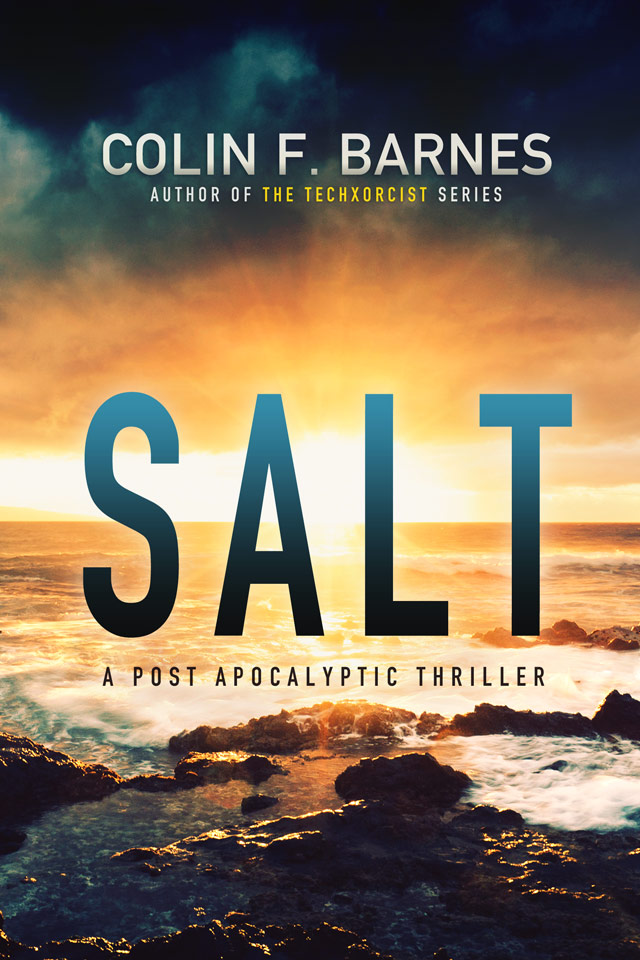Colin F. Barnes is one of the most loveable, hard-working freelance authors I know. We had him on the podcast to discuss his Technothriller series, The Techxorcist, and now I’ve asked him to write a guest post on what makes his novel, SALT: A POST-APOCALYPTIC THRILLER, unique in a crowded genre of Post-Apocalyptic fiction.
Here’s what Colin had to say:
These days, post-apocalypse is a fairly well-established genre with a lot of books covering many of the same subjects. Before this category of fiction was established as a bona-fide sub-genre, authors explored these ideas in the wider categories of science fiction or general fiction.
With many years of titles adding up, the challenge is trying to find something new. A fresh approach to ‘the end of the world as we know it.’
There are a handful of paths to go down such as: Zombies, viruses, EMPs, meteor strikes, alien invasion, nuclear war, and climatic disasters, all of which to varying degrees have explored the subjects in great detail. Zombies and EMPs for example seem to be the flavour of the month.
When I had the idea for my current post-apocalyptic book, SALT, I knew I had to do something different. I had chosen a combination of factors for the basic setup. Climatic disasters informed by an outside event (I won’t give away that reveal here). However, deciding on the apocalyptic event itself is just the first step. You’re not doing anything new here, it’s all been done before, therefore you need something else to bring originality.
For me that was the central narrative. I moved the ‘event’ to the background, taking advantage of the ‘post’ part, i.e. the focus of my story isn’t the event itself, rather its the people left behind; how they cope with the new world, and what struggles they face.
I also wanted to explore more than just their reactions to the event. After a while, we all adapt to our surroundings and other things become important again. For me that’s where the story is. I like reading books that delve into human behaviour and social issues. How do people organise finite and limited resources? How do groups form and how is power and control organised? And with regards to SALT, I wanted to write about what happens when you have multiple factions vying for control and what they would do when a central threat to their existence emerges.
Like all good fiction that uses a familiar set up, the story isn’t in the genre, it’s in the characters. This is, for me, where a lot of ‘PA’ fiction goes wrong. It focuses too much on the event and forgets about the characters. It’s people we relate to, and it’s through these people and their unique outlook on the world that we can explore the real effects of such a devastating event. Just having a military-type character gunning down zombie after zombie isn’t a story, much less the travel story of a group of people going from one fire-fight to another.
Perhaps one of the greatest examples of the characters-are-the-story in this genre is Cormac McCarthy’s The Road. It’s a bleak story for sure, but one that one barely mentions how the world ended. It’s almost an after thought. The real story is in the relationship of the father and son as the journey from inland to the coast.
Another way to bring freshness to the genre is to explore where we’re going wrong as a species and speculate on ways that we can either avoid the coming apocalypse, or how to rebuild after. I think for me that’s one of the greatest elements of the genre. It’s a chance to look out how things could be, or perhaps will be in the future. Science fiction and speculative fiction in general can have a profound effect on humanity and the course we take as a species. We can use this as a tool to experiment with ideas and speculate a way to a better future.
On the flipside, we can use fiction as a warning. With global warming a very real threat whose effects we see everyday around the world, it gives us an opportunity to bring the issues to a wider audience and make people realise the effects of the polar ice caps melting and the seas rising, as but one example. I’m not suggesting we use it for overt propaganda, there still has to be that compelling character-centric story at the heart of it, but by mixing this speculative nature, the writer can bring something new to their stories and avoid being too heavily reliant on common tropes and cliches.
Like dystopian fiction, post-apocalyptic stories are finding a new, wider audience, and that’s only a good thing. Anything that can educate, entertain, and inform is always a welcome addition to the genre, but the writer has to work hard to do something different and fresh. Hopefully, if you read SALT, you’ll find not just an exploration of a post-apocalyptic world, but also an entertaining story.
My thanks to Tim for hosting me today.
Colin F. Barnes
 Colin F. Barnes is a publisher and full-time writer of science fiction and techno thrillers and a member of both the British Fantasy Society and the British Science Fiction Association. He honed his craft with the London School of Journalism and the Open University (BA, English).
Colin F. Barnes is a publisher and full-time writer of science fiction and techno thrillers and a member of both the British Fantasy Society and the British Science Fiction Association. He honed his craft with the London School of Journalism and the Open University (BA, English).
Subscribe to Adventures in SciFi Publishing podcast on: iTunes | Stitcher Radio (Android users) | RSS | Website RSS | Newsletter (Subscribers are entered on giveaways)
This week’s giveaway: 5 ebook copies of Salt by Colin F. Barnes and 3 paper copies of The Best Science Fiction and Fantasy of the Year Volume 8 by Jonathan Strahan. To win, sign up for our newsletter. Giveaway ends next Monday at 11:59 PM CDT. Worldwide entries!


















Speak Your Mind